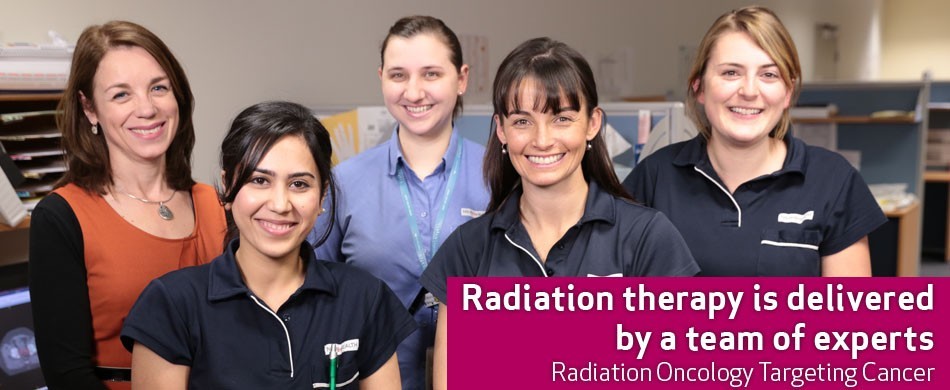What is Radiation Oncology?


GPs and other Health Professionals Click Here
What is radiation oncology?
Radiation oncology (radiotherapy/radiation therapy) is a medical speciality that is an essential part of a multidisciplinary approach to cancer treatment. It uses high energy x rays(photons) most commonly delivered through a linear accelerator. These therapeutic x rays are painless and invisible and are used to treat a number of different cancers. The linear accelerator is housed within a cancer centre and a multidisciplinary team comprising of radiation oncologists (your specialist doctor), nurses, radiation therapists and medical physicists will talk to you about radiation therapy as a treatment option, assess you, plan and deliver your treatment as well as help you with any side effects you experience.
There may be an interval before your treatment is ready to be delivered due to the time needed to plan this highly specialised treatment. Your team will talk to you about the expected start date of your treatment. This time is used to personalise the treatment to your situation and to ensure the treatment is delivered safely and accurately with as minimal side effects as possible. Your team will also help you with treating any side effects and advising you on recovery from your treatment. Your radiation oncologist may also carry on caring for you after completion of your treatment. The goals of the treatment can be to cure you of cancer, to control the growth of the cancer or to reduce the symptoms of cancer such as pain. Radiation therapy is a part of treatment in around 40% of all patients cured of cancer1.
Why is radiation oncology important?
It is estimated that 145,483 Australians were diagnosed with cancer in 20202. The age-standardised incidence rate in 2020 is estimated to be 480 cases per 100,000 persons2. In 2017, 24,453 cancers were registered in New Zealand, at an age-standardised incidence rate of 331 per 100,000 person3. It is estimated that about half of cancer patients will benefit from radiation therapy as part of their overall cancer treatment1. This means that 1 in 2 patients with cancer may benefit from radiation therapy at some point during their illness.
Radiation therapy is a highly cost effective cancer treatment. It costs less than 9 cents out of each health-care dollar spent on treating cancer overall, yet it is vital in about 40% of all cancers that are cured1. With cancer being the leading cause of death world-wide, investment in improving radiation oncology treatments, helping cancer patients access radiation therapy and building new treatment centres have never been more important.
The future of radiation oncology
The technology and treatment techniques used in radiation oncology are constantly improving. Recent advances have benefited many patients with cancer, resulting in higher cure rates, fewer side effects, faster treatment times and reduced number of treatments. New technology provides motion management systems and tumour tracking ability which precisely target radiation beams to the cancer while limiting damage to important adjacent organs. Advances in real-time imaging with CT and MRIs enable treatment teams to compensate for patient movements, such as breathing and also adapting treatment to changes in the tumour shape and size.
Continued investment in radiation therapy services, clinical and laboratory research, and a well trained radiation oncology team is vital for the health of Australians and New Zealanders now and into the future.
References
- http://www.ranzcr.edu.au/radiation-oncology/what-is-radiotherapy
- Cancer in Australia Statistics. Australian Government. https://www.canceraustralia.gov.au/affected-cancer/what-cancer/cancer-australia-statistics
- New cancer registrations 2017 Wellington: Ministry of Health https://www.health.govt.nz/publication/new-cancer-registrations-2017
Page last updated: 30/11/2020



